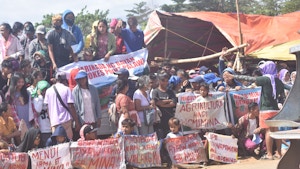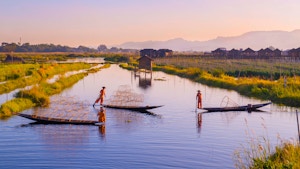#rural communities News

Carbon & Climate
Seeing mangroves regrow: A visual story on the surprise resurgence of Iloilo’s coastal forests
On International Day for the Conservation of the Mangrove Ecosystem, Eco-Business looks at the unexpected rapid growth of a thriving mangrove forest in Iloilo City, Philippines, following the completion of a man-made floodway.

Carbon & Climate
Climate disasters are destroying Pakistan’s mountain languages
Climate-induced disasters are forcing people to migrate out of mountainous areas, and in the process their languages and cultures are being profoundly affected.

Policy & Finance
Jailing local wildlife poachers will not help deliver environmental justice: Thai judge Suntariya Muanpawong
Thailand is still used as a hub for wildlife trafficking networks, and Muanpawong tells Eco-Business that judicial innovation is needed to address the transboundary nature of wildlife trade. Putting the poor in prisons doesn't help, she says.

Food & Agriculture
Sabah is creating forest corridors to save the now-endangered Borneo elephants. Will they work?
Elephant encroachment into plantation estates remain a recurring problem, Eco-Business observes on a recent visit to Sukau, Kinabatangan, where forested areas have been fragmented by thousands of hectares of oil palm sites.
Policy & Finance
Are China’s blue carbon credits a free pass to harm its oceans?
#rural communities Opinion

Transport
More stops needed for UN transport goals
Many cities in the Indo-Pacific have public transport stops close to at least half of their populations, but wider access remains a challenge.

Most Rohingya end up in the Aceh province of Indonesia where they not only face hostility from locals, but more uncertainty about their future.

The outgoing Widodo administration neglected Indigenous land rights in favour of development. The incoming Prabowo administration needs to resolve this issue before such abuse becomes even more widespread.

Policy & Finance
Delhi’s dilemma: a growing economy and growing unemployment
India is on its way to becoming the third-largest economy in the world, yet unemployment among young people with graduate degrees is at an all-time high.
Carbon & Climate
The carbon-offset market’s broken promises
Carbon & Climate
Gender justice is climate justice
#rural communities Videos

Policy & Finance
As anti-mining protests heighten in the Philippines, industry observers call for ‘prudence’ in police intervention
Video footage appears to show protestors, who were demonstrating against mining operations, being dragged away by police near Ipilan Nickel Mine in Brooke’s Point, Palawan. Mining insiders are calling for maximum tolerance in similar standoffs.

Policy & Finance
‘No income, insufficient aid’ for Oriental Mindoro fisherfolk after oil spill: Research group
A coalition of scientists and environmentalists found “widespread economic impacts” for communities in the Philippine province, heightening calls for accountability from the sunken tanker reportedly chartered by a San Miguel Corp subsidiary.

After 20 years without electricity, more than 50 households in Cebu's poorest district have been provided with solar energy, financed by carbon offsets.

Southeast Asia's largest energy consumer has been slow to transition to renewables, but recent policies point to greater expansion of the country's solar, tidal and geothermal energy production.
#rural communities Podcasts

Policy & Finance
‘We do not just adopt global standards, we respond to domestic challenges’: Philippine central bank exec Lyn Javier
The Bangko Sentral ng Pilipinas assistant governor tells the Eco-Business Podcast about the regulator’s maiden sustainability report that features an empirical study of climate impacts on banks as well as the nation’s first taxonomy.

In a region where large hydro projects and expanding biofuel plantations coincide with an upcoming coal phaseout, a laissez-faire approach could worsen existing inequalities and mar the success of a clean energy buildout.

Energy
‘Carrots, sticks, and hugs’: Scrutinising Indonesia’s US$20 billion just transition challenge
The populous coal-rich powerhouse has six months to tell investors how it plans to spend G7 money to decarbonise equitably. We ask experts about the risks, strategy, and opportunities.
#rural communities Press Releases

Energy Development Corporation (EDC)
Macquarie confers ESG Award for social impact to EDC

United Nations Economic and Social Commission for Asia and the Pacific
New UN report: Along with gender, where people live key factor in determining levels of poverty, inequality in APAC

ASEAN Centre for Biodiversity
World Wetlands Day 2024: Securing the health and wellbeing of Asean communities

United Nations Development Programme
25 countries halved multidimensional poverty within 15 years, but 1.1 billion remain poor
#rural communities Research

Eco-Business, supported by Boehringer Ingelheim
Moving towards a rabies-free Southeast Asia













